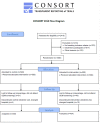A Mediterranean diet with additional extra virgin olive oil and pistachios reduces the incidence of gestational diabetes mellitus (GDM): A randomized controlled trial: The St. Carlos GDM prevention study
- PMID: 29049303
- PMCID: PMC5648128
- DOI: 10.1371/journal.pone.0185873
A Mediterranean diet with additional extra virgin olive oil and pistachios reduces the incidence of gestational diabetes mellitus (GDM): A randomized controlled trial: The St. Carlos GDM prevention study
Abstract
Background: Gestational diabetes mellitus (GDM) prevalence is increasing and becoming a major public health concern. Whether a Mediterranean diet can help prevent GDM in unselected pregnant women has yet to be studied.
Methods: We conducted a prospective, randomized controlled trial to evaluate the incidence of GDM with two different dietary models. All consecutive normoglycemic (<92 mg/dL) pregnant women at 8-12 gestational weeks (GW) were assigned to Intervention Group (IG, n = 500): MedDiet supplemented with extra virgin olive oil (EVOO) and pistachios; or Control Group (CG, n = 500): standard diet with limited fat intake. Primary outcome was to assess the effect of the intervention on GDM incidence at 24-28 GW. Gestational weight gain (GWG), pregnancy-induced hypertension, caesarean section (CS), preterm delivery, perineal trauma, small and large for gestational age (SGA and LGA) and admissions to neonatal intensive care unit were also assessed. Analysis was by intention-to-treat.
Results: A total of 874 women completed the study (440/434, CG/IG). According to nutritional questionnaires and biomarker analysis, women in the IG had a good adherence to the intervention. 177/874 women were diagnosed with GDM, 103/440 (23.4%) in CG and 74/434(17.1%) in IG, p = 0.012. The crude relative risk (RR) for GDM was 0.73 (95% CI: 0.56-0.95; p = 0.020) IG vs CG and persisted after adjusted multivariable analysis, 0.75(95% CI: 0.57-0.98; p = 0.039). IG had also significantly reduced rates of insulin-treated GDM, prematurity, GWG at 24-28 and 36-38 GW, emergency CS, perineal trauma, and SGA and LGA newborns (all p<0.05).
Conclusions: An early nutritional intervention with a supplemented MedDiet reduces the incidence of GDM and improves several maternal and neonatal outcomes.
Conflict of interest statement
References
-
- Linnenkamp U, Guariguata L, Beagley J, Whiting D, Cho N. The IDF Diabetes Atlas methodology for estimating global prevalence of hyperglycaemia in pregnancy. Diabetes Res Clin Pract 2014;103:186–96. doi: 10.1016/j.diabres.2013.11.004 - DOI - PubMed
-
- National Institutes of Health consensus development conference statement: diagnosing gestational diabetes mellitus, March 4–6, 2013.Obstet & Gynecol 2013;122(2 Pt 1):358–69. - PubMed
-
- Duran A, Sáenz S, Torrejón M, Bordiú E, del Valle L, Galindo M, et al. Introduction of IADPSG Criteria for the Screening and Diagnosis of Gestational Diabetes Mellitus Results in Improved Pregnancy Outcomes at a Lower Cost in a Large Cohort of Pregnant Women: The St. Carlos Gestational Diabetes Study. Diabetes Care 2014;37:2442–50. doi: 10.2337/dc14-0179 - DOI - PubMed
-
- Poston L, Bell R, Croker H, Flynn AC, Godfrey KM, Goff L, et al. Effect of a behavioural intervention in obese pregnant women (the UPBEAT study): a multicentre, randomised controlled trial. Lancet Diabetes Endocrinol 2015;3:767–77. doi: 10.1016/S2213-8587(15)00227-2 - DOI - PubMed
-
- Rogozińska E, Chamillard M, Hitman G, Khan K, Thangaratinam S. Nutritional Manipulation for the Primary Prevention of Gestational Diabetes Mellitus: A Meta-Analysis of Randomised Studies. PLoS One 2015;10:e0115526 doi: 10.1371/journal.pone.0115526 - DOI - PMC - PubMed
Publication types
MeSH terms
Substances
LinkOut - more resources
Full Text Sources
Other Literature Sources


